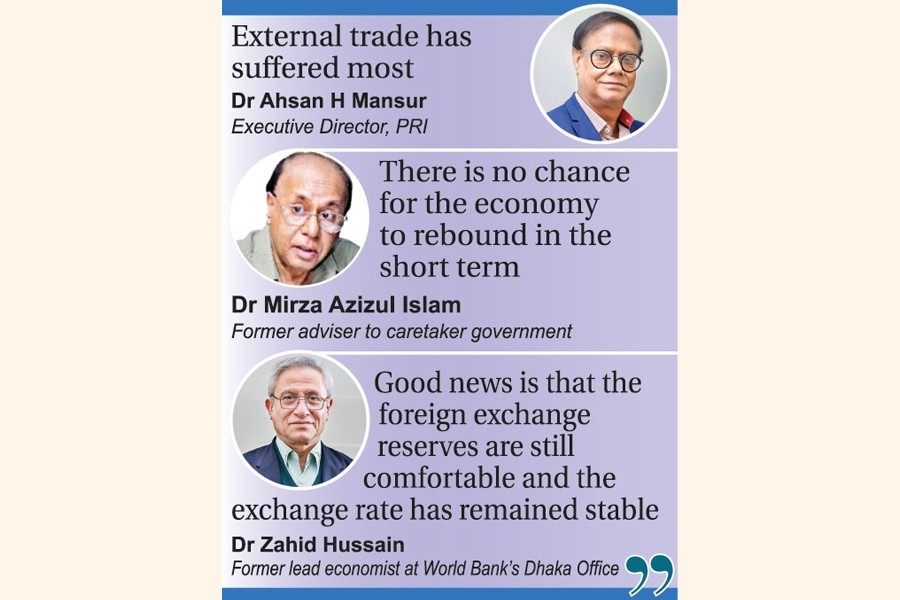
Published :
Updated :

The economy's almost all major indicators have dipped, drained by sluggish economic activities in the wake of shutdowns aimed at stemming the spread of coronavirus.
Remittances, exports, imports, inter-bank call money, private sector credit growth fell or worsened over the past few months, according to central bank data.
The Bangladesh Bank publishes selected economic indicators electronically with the latest information and economic statistics in the areas of money market, balance of payments, fiscal data and capital market.
Economists viewed this is a common scenario of all developing economies straining under the weight of the virus.
They said such a situation will continue throughout the year while there are uncertainties over whether it will revive in the next year.
Dr Ahsan H Mansur, executive director of the Policy Research Institute of Bangladesh, a think-tank in Dhaka, noted the external trade has suffered most during the past few months.
Export receipts sank by 83 per cent in April as the demand for textiles and clothing dropped in the virus-battered Europe and the United States, the country's top destinations for merchandised shipments.
Dr. Mansur said there is a huge fall in imports, especially, petroleum products and opening of back-to-back letters of credit during the period.
There is a significant fall in remittances as well. The BB statistics shows that it slipped by over 24 per cent in April.
Money wired by expatriates has been less than expected due to the COVID-19, which forced the Middle East and other major labour-hosting countries shutter industrial plants. Many Bangladeshi living abroad lost their jobs and tens of thousands have returned home in recent months.
Dr Mansur, however, said the balance of payments (BoP) posted a small surplus as import fall has offset the exports drop.
He called this "contractionary balance" of the BoP.
"We prefer expansionary balance as such type of BoP indicates a healthy economy," said Dr Mansur, chairman at the BRAC Bank.
Dr AB Mirza Azizul Islam, a former adviser to the caretaker government on the ministry of finance and planning, told the FE there is no chance of rebound in the short time.
"Our economy is now connected with other economies; all are impacted so we have little chance for revival" he argued.
He said the shipment will not pick up as the importing nations are in trouble. Dr Islam said the government should now concentrate on efforts so that poverty and starvation cannot worsen.
He said corruption in the distribution of relief and other social safety net programmes should be stopped.
Dr Islam, who now teaches economics at BRAC University, said the government should now think about the second round of stimulus as the coronovirus may prolong.
"So far it's ok, but the second phase of stimulus may be needed if the pandemic lingers on," he added.
Dr Zahid Hussain said export, imports, remittances and tax revenues have taken a hit.
"This is not unexpected, given the deteriorating state of the global economy, and its spillover effects on Bangladesh and domestic economic disruptions due to the spread of the virus," said Dr Hussain, a former lead economist at the World Bank's Dhaka office.
Had the Bangladesh Bank provided updated information on other indicators, the situation would have looked even worse, he told the FE.
He said the only good news is that the foreign exchange reserves are still comfortable and the exchange rate appears to have remained stable.
Dr Hussain underlined the importance of updating economic gauges by the central bank on a regular basis.
According to the selected indicators, the foreign exchange reserve stood at US$ 32.8 billion as of May 17, which was over $33 billion in April, 2020.
The inter-bank dollar-taka exchange rate rose to Tk 84.9. the inter-bank call money rate increased to 4.9 per cent, remittance slumped by over 24 per cent in April last, export skidded to US$ 502 million decelerating by 83 per cent in April last.
Credit to the private sector fell to 4.8 per cent during July-February of this fiscal year versus 6.9 per cent over the same period a year earlier.
jasimharoon@yahoo.com


 For all latest news, follow The Financial Express Google News channel.
For all latest news, follow The Financial Express Google News channel.